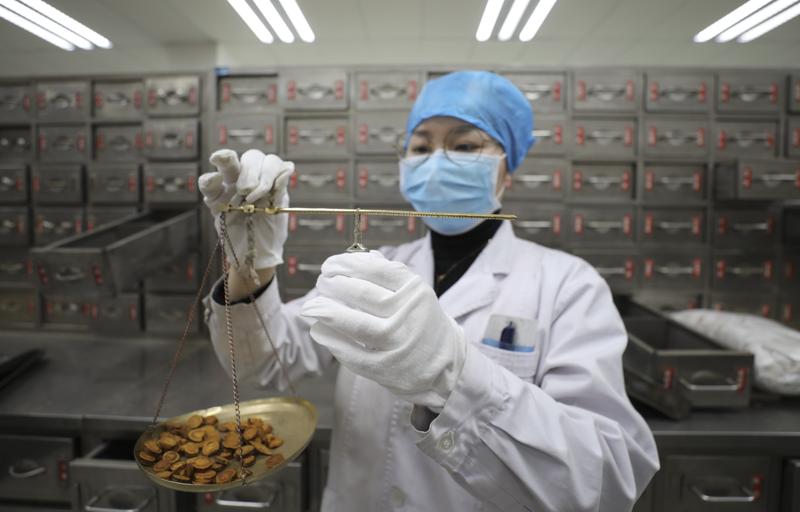Experts say combining therapy with Western medicine enhances treatment
 A pharmacist weighs Chinese herbal medicines for patients infected with the novel coronavirus at Anhui Provincial Hospital of Traditional Chinese Medicine in Hefei, east China's Anhui Province, Feb 18, 2020. (BAI BIN / XINHUA)
A pharmacist weighs Chinese herbal medicines for patients infected with the novel coronavirus at Anhui Provincial Hospital of Traditional Chinese Medicine in Hefei, east China's Anhui Province, Feb 18, 2020. (BAI BIN / XINHUA)
Traditional Chinese medicine treatments used in previous COVID-19 outbreaks are being adjusted to successfully target the new Delta variant, medical experts said. Combining TCM approaches with Western therapies has played an effective role in saving patients' lives and accelerating their recovery from the novel coronavirus.
Zhang Zhongde, vice-president of Guangdong Hospital of Traditional Chinese Medicine in Guangzhou, said TCM experts believe the Delta strain does not affect the core pathology of individual COVID-19 illnesses and basic treatment principles remain roughly identical.
"Typical symptoms seen during the first wave of the outbreak that hit Wuhan the hardest-such as gastrointestinal reactions, fever, cough and shortness of breath-also appear in the recent infection clusters, but there are differences in their incidence and severity in patients," he said.
Liu Qingquan, president of the Beijing Hospital of Traditional Chinese Medicine, said patients infected with the Delta strain are more infectious and have higher viral loads in their bodies, compared with people with earlier strains.
"As recent outbreaks have occurred in summertime, the qi (a vital energy helping the body to maintain health) will be further diminished due to the season, resulting in the patients feeling more feeble," he said at a news briefing.
In clinical settings, patients begin to show symptoms sooner after contracting the Delta strain and more people develop fevers, Liu added.
"While the guiding principle for TCM treatment is still based on the latest national diagnosis and treatment plan released in April, we have tailored specific prescriptions to the conditions of patients," he said.
Liu said TCM practitioners are adding more ingredients that can alleviate summertime heat-related symptoms for patients infected with the Delta variant. As they are getting sicker quicker, TCM therapies designed to curtail acute symptoms have also been used more widely to help prevent severe infections.
Zhang, from the Guangdong hospital, has worked on the front line against the Delta strain in Guangdong, Yunnan and Jiangsu provinces since May.
He said to achieve the best outcomes for patients, one vital lesson is to ensure collaboration between TCM and Western medicine practitioners.
During the recent outbreaks, hospital wards have been staffed with both TCM and Western medicine groups, who have devised and discussed treatment plans, Zhang said.
In one case, a severely ill patient in Jiangsu who had been placed on a ventilator was suffering a high fever, bloating and constipation. Zhang said TCM therapies to target these symptoms and boost overall energy were given to the patient to stabilize his condition and enable him to be put on extracorporeal membrane oxygenation, a life support machine.
"Overall, combining TCM with Western medicine and using TCM throughout the treatment process have played a good role in alleviating patients' symptoms and aiding turning positive nucleic acid test results negative," he added.
"No matter how the epidemic might change in the future, the model of combining TCM with Western medicine should be implemented thoroughly," he said.
Ye Yong'an, a physician at the Beijing University of Chinese Medicine's Dongzhimeng Hospital, said giving oxygen and antiviral drugs has undoubtedly played a fundamental role in treatment throughout the epidemic. Combining that with TCM can yield even better outcomes, he said.
"One notable feature of TCM is that we can give and adapt therapies based on the health status of each individual," he said in an interview with People's Daily. "TCM doctors are also keeping an eye on virus mutations and are ready to adjust our therapies accordingly."
China reported six locally transmitted infections and 22 imported cases on Tuesday, as a series of local outbreaks driven by the Delta variant are showing signs of abating, the National Health Commission said on Wednesday.
Ma Xiaowei, the health minister, said on Monday that China will try to contain the virus' domestic spread by the end of August.
On Wednesday, a worker at the Songjiang District Central Hospital in Shanghai was confirmed to be infected with COVID-19, officials said at a news conference on the city's epidemic prevention and control work. The hospital has suspended its outpatient and emergency treatment services. The worker, a 25-year-old woman who showed mild symptoms, was vaccinated and is being treated in an isolation ward at another medical institution, the officials said.
The apartment building where the worker lived is designated as medium-risk area for COVID-19. All 10 close contacts of the patient and more than 7,400 people who might be exposed to the virus in the case tested negative for coronavirus as of 6 pm on Wednesday, according to the city government.
Zhou Wenting in Shanghai contributed to this story.


